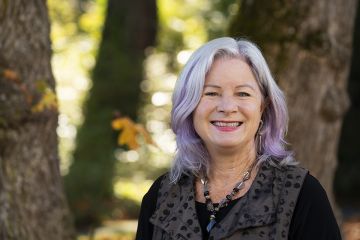Hikes to home workouts: Expert Q&A on healthy activity during the pandemic

From hikes to home workouts, all varieties of movement are known to improve both mental and physical health. So, when the COVID-19 pandemic hit and lockdowns started in Canada, it was a cause for concern.
Ryan Rhodes, exercise psychologist and director of the Behavioural Medicine Lab at the University of Victoria, studies the psychology of physical activity and sedentary behaviour, including what motivates people to engage in exercise. Based on a number of recently published studies, Rhodes talks about motivation during the pandemic, the disruption of usual habits and the importance of staying active as we move into winter.
Q. What were your main research findings so far about physical activity during the COVID-19 pandemic?
A. Canadian adults reported that their moderate to vigorous intensity physical activity declined on average by 46 min per week. That wasn’t uniform, though. For 58 per cent of our sample, their level of physical activity changed very little. About 15 per cent were active pre-pandemic and then struggled during the early weeks of the pandemic but found their way to physical activity again. A very small group of six per cent became more active during the pandemic. About 20 per cent were active pre-pandemic and became inactive during the pandemic—this is the group we’re concerned about.
Canadian children and youth were generally outdoors a lot less, instead spending their time indoors and on screens. That’s concerning because before the pandemic, only 15 per cent of Canadian children were regularly active. Seeing these physical activity rates plummet even further is certainly concerning.
Q. In one of your studies, you found that for many adults, their physical activity decreased but then returned to normal? What helped them get back on track?
A. That was a particularly interesting group because they had one core predictor—they reported having home equipment and home exercise programming. These were people who turned to YouTube for exercise classes or had home equipment. What I think was going on is that they went to gyms and other exercise classes and the pandemic broke their habit routine. But they showed the ingenuity to find other resources to get active again.
Q. What are your concerns as we move into winter?
A. When it gets darker and colder, we are less active. We rely a lot more on planned activities, like exercise, at that time. A lot of the more incidental movement behaviours—“Hey, look at the beautiful evening, let’s go outside for a walk”—start to disappear in bad weather. It’s particularly a concern because movement behaviours are so linked to mental health and quality of life. Overall, getting outside regularly, even if for brief bouts, can help, particularly for children and youth.
Q. What are some easy ways to start forming new habits?
A. Typically habits will form by pairing the same behaviour within a similar context with similar cues: “Every morning, I drink my coffee, and then I go for a walk.” What doesn’t work well is a kind of cue that’s going all the time when you’re not doing it. If you put a sticky note on the fridge that says, “Get active!” and then pass that note ten times a day when you’re not getting active, it’s not a very useful habit reminder. You want things that really cue you to do the activity and then disappear from your awareness until the next time you need to be cued to do the activity. Time of day, such as morning physical activity, is a particularly helpful cue.
Q. What can we do right now to take care of our mental and physical health?
A. Right now, it’s important to note that some of the physical activity that we took for granted has disappeared because of the lockdown. Active transport to work, even walking from the parking lot, and incidental movement during our breaks has decreased for many of us. People should try to be a bit of an explorer to find out what new activity works for them during this time. Most people will be more likely to continue with socially engaging activities that are relatively easy to do. We’re a little socially starved these days. If you can take a socially distant walk with a friend or join an online class with other people, you can engage both your need for social activity as well as your need for physical activity. It’s probably more important now than ever to do that.
Accelerate COVID-19 recovery
Research plays a vital role in solving the world’s big challenges including how communities respond to COVID-19.
UVic’s Research Accelerator Fund is a seed fund that will support and boost research at our university.
Photos
In this story
Keywords: COVID, health, Exercise Science, Physical and Health Education, Behavioural Medicine Lab, Research Accelerator Fund, administrative
People: Ryan Rhodes











